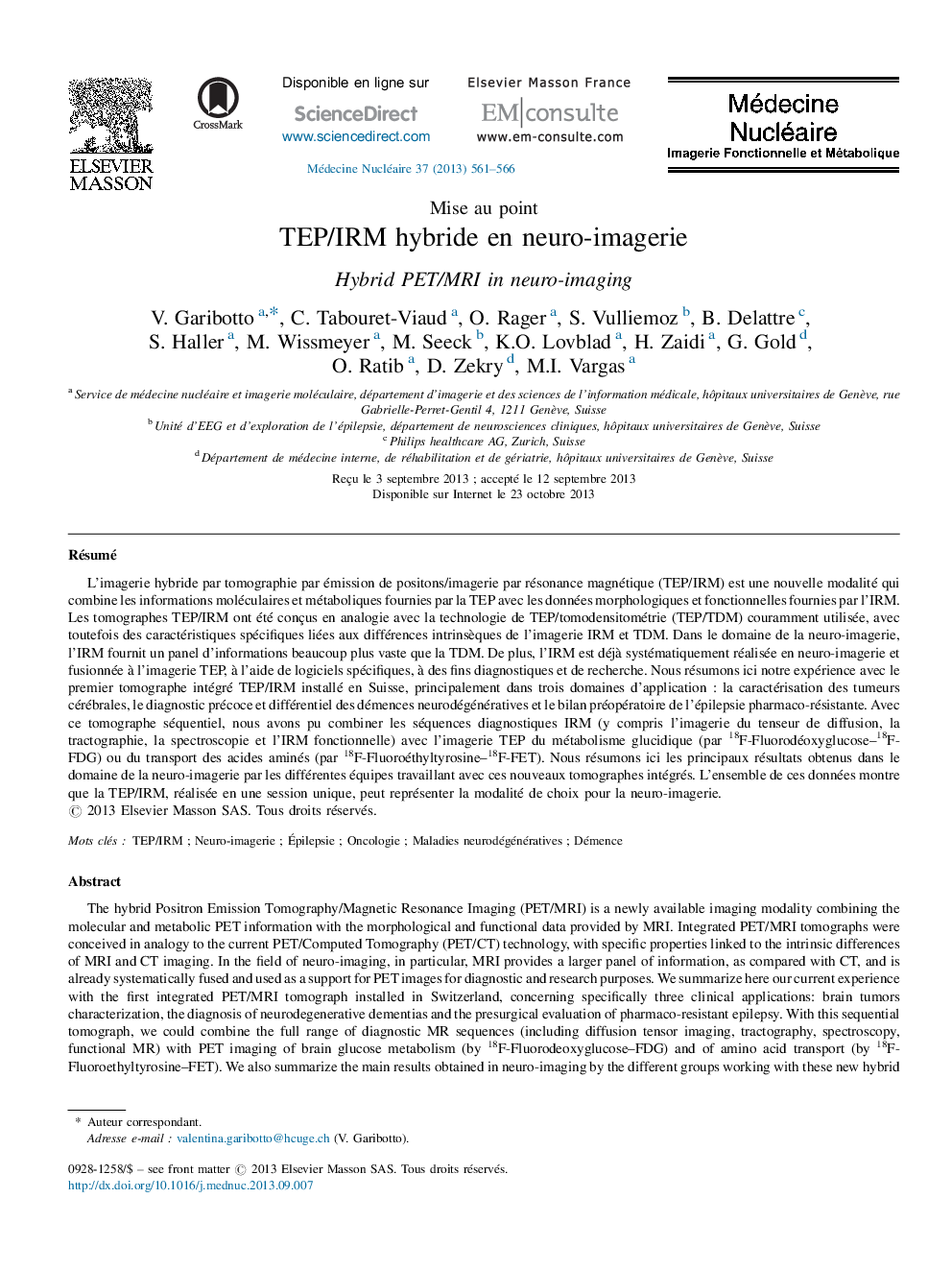| Article ID | Journal | Published Year | Pages | File Type |
|---|---|---|---|---|
| 4244149 | Médecine Nucléaire | 2013 | 6 Pages |
RésuméL’imagerie hybride par tomographie par émission de positons/imagerie par résonance magnétique (TEP/IRM) est une nouvelle modalité qui combine les informations moléculaires et métaboliques fournies par la TEP avec les données morphologiques et fonctionnelles fournies par l’IRM. Les tomographes TEP/IRM ont été conçus en analogie avec la technologie de TEP/tomodensitométrie (TEP/TDM) couramment utilisée, avec toutefois des caractéristiques spécifiques liées aux différences intrinsèques de l’imagerie IRM et TDM. Dans le domaine de la neuro-imagerie, l’IRM fournit un panel d’informations beaucoup plus vaste que la TDM. De plus, l’IRM est déjà systématiquement réalisée en neuro-imagerie et fusionnée à l’imagerie TEP, à l’aide de logiciels spécifiques, à des fins diagnostiques et de recherche. Nous résumons ici notre expérience avec le premier tomographe intégré TEP/IRM installé en Suisse, principalement dans trois domaines d’application : la caractérisation des tumeurs cérébrales, le diagnostic précoce et différentiel des démences neurodégénératives et le bilan préopératoire de l’épilepsie pharmaco-résistante. Avec ce tomographe séquentiel, nous avons pu combiner les séquences diagnostiques IRM (y compris l’imagerie du tenseur de diffusion, la tractographie, la spectroscopie et l’IRM fonctionnelle) avec l’imagerie TEP du métabolisme glucidique (par 18F-Fluorodéoxyglucose–18F-FDG) ou du transport des acides aminés (par 18F-Fluoroéthyltyrosine–18F-FET). Nous résumons ici les principaux résultats obtenus dans le domaine de la neuro-imagerie par les différentes équipes travaillant avec ces nouveaux tomographes intégrés. L’ensemble de ces données montre que la TEP/IRM, réalisée en une session unique, peut représenter la modalité de choix pour la neuro-imagerie.
The hybrid Positron Emission Tomography/Magnetic Resonance Imaging (PET/MRI) is a newly available imaging modality combining the molecular and metabolic PET information with the morphological and functional data provided by MRI. Integrated PET/MRI tomographs were conceived in analogy to the current PET/Computed Tomography (PET/CT) technology, with specific properties linked to the intrinsic differences of MRI and CT imaging. In the field of neuro-imaging, in particular, MRI provides a larger panel of information, as compared with CT, and is already systematically fused and used as a support for PET images for diagnostic and research purposes. We summarize here our current experience with the first integrated PET/MRI tomograph installed in Switzerland, concerning specifically three clinical applications: brain tumors characterization, the diagnosis of neurodegenerative dementias and the presurgical evaluation of pharmaco-resistant epilepsy. With this sequential tomograph, we could combine the full range of diagnostic MR sequences (including diffusion tensor imaging, tractography, spectroscopy, functional MR) with PET imaging of brain glucose metabolism (by 18F-Fluorodeoxyglucose–FDG) and of amino acid transport (by 18F-Fluoroethyltyrosine–FET). We also summarize the main results obtained in neuro-imaging by the different groups working with these new hybrid tomographs. These data show that PET/MRI, acquired in a single imaging session, may represent the modality of choice for neuro-imaging.
